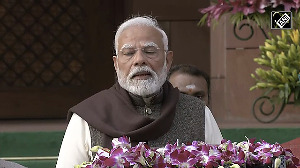Shockingly, in almost all the acts of terrorism that have occurred since the blasts in New Delhi just before Diwali 2005, not one terrorist has been arrested for the crimes.
The only arrests have been made in Mumbai, but there is some doubt if the arrested are indeed the terrorists responsible for killing 188 people and maiming hundreds of others, many of them for life. One view in the Mumbai police is that under sustained political pressure, the city's Anti Terrorist Squad could have picked up individuals with dubious antecedents, but who may or may not be involved with the actual conspiracy.
As one senior crimefighter in the Maharashtra police force told us two years ago, if those arrested are not the terrorists who attacked seven Western Railway trains on July 11, 2006, India is in serious trouble. The actual terrorists, he feared, would be free to run amuck, spreading mayhem whenever and wherever they wanted.
Law enforcement agencies scored a big victory against the forces of terror earlier this year when they arrested Safdar Nagouri, the Students Islamic Movement of India leader and alleged terror mastermind, and many of his accomplices. The intelligence agencies believed the arrests delivered a mortal blow to SIMI and its agents of terror. However, that does not now seem to be the case.
SIMI's lower rungs -- masquerading under the name Indian Mujahideen -- have struck thrice in the last 100 days, with aggravated diabolical direction.
The accent is clearly on increasing the number of attacks and spreading its geographical width. The number of attacks in Ahmedabad was no doubt intended to deliver the maximum impact. Gujarat has not had a single terror attack since the assault on the Akshardham temple on September 30, 2002. The terrorists had to increase the number of attacks to a number hitherto unseen in India and at key points in Ahmedabad's landscape to deliver their message of hate with renewed force.
We are dealing with desperate, evil individuals, make no mistake about that, and the timing and attack on Ahmedabad's civil hospital is renewed evidence of this.
But the terrorists could have overplayed their hand this time. For the first time since the March 12, 1993 serial blasts in Mumbai, one detects signs of panic. That case was cracked open by Rakesh Maria, now Mumbai's additional commissioner of police (crime), after the gangsters abandoned a car in panic when they witnessed the devastation wrought near the city passport office, the worst blast in those serial blasts.
A search of the vehicle yielded information about its ownership -- it belonged to the Memons. When he landed at the Memons's home in Mahim, north central Mumbai, the 6 feet 2 inches Maria discovered by chance the key to a scooter with explosives, which had also been abandoned in the north central area of Parel two days after the blasts. The plot unravelled quickly thereafter.
The bomb discovered in a garbage lot in Ahmedabad and the explosive-laden WagonR abandoned in Surat on Sunday indicate that some of the terrorists may have panicked after the blasts and quickly dumped the incriminating material for fear of discovery. They must have known that an alert would be sounded in Gujarat after the blasts and all cars searched. In none of the blast cases since October 29, 2005 have the law enforcement agencies obtained such powerful evidence. Deciphered painstakingly by the intelligence and law enforcement agencies, the WagonR and its cargo could lead the investigators to some of the terrorists.
Speaking on Barkha Dutt's We The People on Sunday night biopharma pioneer Kiran Mazumder-Shaw decried the fact that the investigators are not making sufficient use of technology, especially since the terrorists are doing just that. Some of the individuals involved in the terror plot are certainly tech savvy and may have a background in software like the alleged SIMI activist from Kerala whose arrest reportedly led the intelligence agencies to Nagouri. However, technology by itself will not be enough.
Speaking to a couple of colleagues in the wake of the 2006 Mumbai blasts, one of the city's finest police officers blamed the excessive reliance on tapping phones as one reason why the police force's penetration of the terror networks is poor. Police officers have bartered away the painstaking business of cultivating sources among the section of the population most vulnerable to the terrorists for the easier routes of tapping phones and accessing e-mail accounts. The result: They have very little information they can act on.
Of course, as the police officer hastened to add, the current groups of terrorists are a zero vice lot -- they don't frequent bars or patronise prostitutes -- unlike the gangsters behind the 1993 blasts in Mumbai. Today's terrorists are devout, single-minded men who rarely stray from their immediate orbit. This makes it extremely difficult for the law enforcement agencies to penetrate the terror networks or secure sources within the enemy's ranks.
The terrorists have so far failed in their ultimate plan to provoke unspeakable communal bloodshed by their attacks. The peace has held for three years, but for how long more? How long will Indians continue to understand that such attacks of terror are the handiwork of a lunatic fringe which does not care that many Muslims have died in the blasts (in Hyderabad last August, more Muslims died than Hindus)? How long before some crazy rabble-rouser provokes mindless retaliation? After all, we are close to an election, and there will be politicians who see electoral value in deepening the communal divide.
Influential leaders like Jamiat-ulama-i-Hind President Maulana Arshad Madni have sounded the first battle cry against terrorism among Indian Muslims, but if the war against terror has to make any influential progress, ordinary Muslims must realise the danger that terrorism poses to all Indian people and begin to give up the traitors in their midst.
The governments at the Centre and in the states must reciprocate this trust by being doubly careful when apprehending likely suspects after blasts like the ones in Ahmedabad and Bengaluru. The careless arrests made after the Hyderabad blasts last August have needlessly alienated an entire community and probably inspired some young men to take up the cause of jihad in retaliation.
The Gujarat riots set the communal environment in India back 20 years, a strategic thinker in the Research and Analysis Wing is said to have noted a couple of years ago. While the intelligence and law enforcement agencies must unleash a no holds barred war against the terrorists, we must be very careful to ensure that there is no retributive response to acts of terror.






 © 2025
© 2025